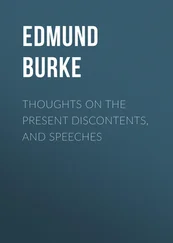Edmund Burke - Selections from the Speeches and Writings of Edmund Burke
Здесь есть возможность читать онлайн «Edmund Burke - Selections from the Speeches and Writings of Edmund Burke» — ознакомительный отрывок электронной книги совершенно бесплатно, а после прочтения отрывка купить полную версию. В некоторых случаях можно слушать аудио, скачать через торрент в формате fb2 и присутствует краткое содержание. Жанр: foreign_prose, История, Политика, literature_19, foreign_edu, foreign_antique, на английском языке. Описание произведения, (предисловие) а так же отзывы посетителей доступны на портале библиотеки ЛибКат.
- Название:Selections from the Speeches and Writings of Edmund Burke
- Автор:
- Жанр:
- Год:неизвестен
- ISBN:нет данных
- Рейтинг книги:4 / 5. Голосов: 1
-
Избранное:Добавить в избранное
- Отзывы:
-
Ваша оценка:
- 80
- 1
- 2
- 3
- 4
- 5
Selections from the Speeches and Writings of Edmund Burke: краткое содержание, описание и аннотация
Предлагаем к чтению аннотацию, описание, краткое содержание или предисловие (зависит от того, что написал сам автор книги «Selections from the Speeches and Writings of Edmund Burke»). Если вы не нашли необходимую информацию о книге — напишите в комментариях, мы постараемся отыскать её.
Selections from the Speeches and Writings of Edmund Burke — читать онлайн ознакомительный отрывок
Ниже представлен текст книги, разбитый по страницам. Система сохранения места последней прочитанной страницы, позволяет с удобством читать онлайн бесплатно книгу «Selections from the Speeches and Writings of Edmund Burke», без необходимости каждый раз заново искать на чём Вы остановились. Поставьте закладку, и сможете в любой момент перейти на страницу, на которой закончили чтение.
Интервал:
Закладка:
So far with regard to the extent. The population of this great empire is not easily to be calculated. When the countries, of which it is composed, came into our possession, they were all eminently peopled, and eminently productive; though at that time considerably declined from their ancient prosperity. But, since they are come into our hands!—! However, if we make the period of our estimate immediately before the utter desolation of the Carnatic, and if we allow for the havoc which our government had even then made in these regions, we cannot, in my opinion, rate the population at much less than thirty millions of souls,—more than four times the number of persons in the Island of Great Britain.
My next inquiry to that of the number, is the quality and description of the inhabitants. This multitude of men does not consist of an abject and barbarous populace; much less of gangs of savages, like the Guaranies and Chiquitos, who wander on the waste borders of the river of Amazons, or the Plate; but a people for ages civilized and cultivated; cultivated by all the arts of polished life, whilst we were yet in the woods. There have been (and still the skeletons remain) princes once of great dignity, authority, and opulence. There are to be found the chiefs of tribes and nations. There is to be found an ancient and venerable priesthood, the depository of their laws, learning, and history, the guides of the people whilst living, and their consolation in death; a nobility of great antiquity and renown; a multitude of cities, not exceeded in population and trade by those of the first class in Europe; merchants and bankers, individual houses of whom have once vied in capital with the Bank of England; whose credit had often supported a tottering state, and preserved their governments in the midst of war and desolation; millions of ingenious manufacturers and mechanics; millions of the most diligent, and not the least intelligent, tillers of the earth. There are to be found almost all the religions professed by men,—the Brahminical, the Mussulman, the Eastern and the Western Christian.
If I were to take the whole aggregate of our possessions there, I should compare it, as the nearest parallel I can find, with the empire of Germany. Our immediate possessions I should compare with the Austrian dominions,—and they would not suffer in the comparison. The nabob of Oude might stand for the king of Prussia; the nabob of Arcot I would compare, as superior in territory and equal in revenue, to the elector of Saxony. Cheyt Sing, the rajah of Benares, might well rank with the prince of Hesse, at least; and the rajah of Tanjore (though hardly equal in extent of dominion, superior in revenue), to the elector of Bavaria. The Polygars and the northern Zemindars, and other great chiefs, might well class with the rest of the princes, dukes, counts, marquises, and bishops, in the empire; all of whom I mention to honour, and surely without disparagement to any or all of those most respectable princes and grandees. All this vast mass, composed of so many orders and classes of men, is again infinitely advocated by manners, by religion, by hereditary employment, through all their possible combinations. This renders the handling of India a matter in a high degree critical and delicate. But oh! it has been handled rudely indeed. Even some of the reformers seem to have forgot that they had anything to do but to regulate the tenants of a manor, or the shopkeepers of the next county town.
It is an empire of this extent, of this complicated nature, of this dignity and importance, that I have compared to Germany, and the German government; not for an exact resemblance, but as a sort of a middle term, by which India might be approximated to our understandings, and if possible to our feelings; in order to awaken something of sympathy for the unfortunate natives, of which I am afraid we are not perfectly susceptible, whilst we look at this very remote object through a false and cloudy medium.
POLITICAL CHARITY
Honest men will not forget either their merit or their sufferings. There are men (and many, I trust, there are) who, out of love to their country and their kind, would torture their invention to find excuses for the mistakes of their brethren; and who, to stifle dissension, would construe even doubtful appearances with the utmost favour: such men will never persuade themselves to be ingenious and refined in discovering disaffection and treason in the manifest, palpable signs of suffering loyalty. Persecution is so unnatural to them, that they gladly snatch the very first opportunity of laying aside all the tricks and devices of penal politics; and of returning home, after all their irksome and vexatious wanderings, to our natural family mansion, to the grand social principle, that unites all men, in all descriptions, under the shadow of an equal and impartial justice.
EVILS OF DISTRACTION
The very attempt towards pleasing everybody discovers a temper always flashy, and often false and insincere. Therefore as I have proceeded straight onward in my conduct, so I will proceed in my account of those parts of it which have been most excepted to. But I must first beg leave just to hint to you, that we may suffer very great detriment by being open to every talker. It is not to be imagined how much of service is lost from spirits full of activity and full of energy, who are pressing, who are rushing forward, to great and capital objects, when you oblige them to be continually looking back. Whilst they are defending one service, they defraud you of an hundred. Applaud us when we run; console us when we fall; cheer us when we recover; but let us pass on—for God's sake let us pass on.
CHARLES FOX
And now, having done my duty to the bill, let me say a word to the author. I should leave him to his own noble sentiments, if the unworthy and illiberal language with which he has been treated, beyond all example of parliamentary liberty, did not make a few words necessary; not so much in justice to him, as to my own feelings. I must say, then, that it will be a distinction honourable to the age, that the rescue of the greatest number of the human race that ever were so grievously oppressed, from the greatest tyranny that was ever exercised, has fallen to the lot of abilities and dispositions equal to the task; that it has fallen to one who has the enlargement to comprehend, the spirit to undertake, and the eloquence to support, so great a measure of hazardous benevolence. His spirit is not owing to his ignorance of the state of men and things; he well knows what snares are spread about his path, from personal animosity, from court intrigues, and possibly from popular delusion. But he has put to hazard his ease, his security, his interest, his power, even his darling popularity, for the benefit of a people whom he has never seen. This is the road that all heroes have trod before him. He is traduced and abused for his supposed motives. He will remember, that obloquy is a necessary ingredient in the composition of all true glory: he will remember, that it was not only in the Roman customs, but it is in the nature and constitution of things, that calumny and abuse are essential parts of triumph. These thoughts will support a mind, which only exists for honour, under the burthen of temporary reproach. He is doing indeed a great good; such as rarely falls to the lot, and almost as rarely coincides with the desires, of any man. Let him use his time. Let him give the whole length of the reins to his benevolence. He is now on a great eminence, where the eyes of mankind are turned to him. He may live long, he may do much. But here is the summit. He never can exceed what he does this day.
He has faults; but they are faults that, though they may in a small degree tarnish the lustre, and sometimes impede the march, of his abilities, have nothing in them to extinguish the fire of great virtues. In those faults there is no mixture of deceit, of hypocrisy, of pride, of ferocity, of complexional despotism, or want of feeling for the distresses of mankind. His are faults which might exist in a descendant of Henry the Fourth of France, as they did exist in that father of his country. Henry the Fourth wished that he might live to see a fowl in the pot of every peasant in his kingdom. That sentiment of homely benevolence was worth all the splendid sayings that are recorded of kings. But he wished perhaps for more than could be obtained, and the goodness of the man exceeded the power of the king. But this gentleman, a subject, may this day say this at least, with truth, that he secures the rice in his pot to every man in India. A poet of antiquity thought it one of the first distinctions to a prince whom he meant to celebrate, that through a long succession of generations, he had been the progenitor of an able and virtuous citizen, who by force of the arts of peace, had corrected governments of oppression, and suppressed wars of rapine.
Читать дальшеИнтервал:
Закладка:
Похожие книги на «Selections from the Speeches and Writings of Edmund Burke»
Представляем Вашему вниманию похожие книги на «Selections from the Speeches and Writings of Edmund Burke» списком для выбора. Мы отобрали схожую по названию и смыслу литературу в надежде предоставить читателям больше вариантов отыскать новые, интересные, ещё непрочитанные произведения.
Обсуждение, отзывы о книге «Selections from the Speeches and Writings of Edmund Burke» и просто собственные мнения читателей. Оставьте ваши комментарии, напишите, что Вы думаете о произведении, его смысле или главных героях. Укажите что конкретно понравилось, а что нет, и почему Вы так считаете.












